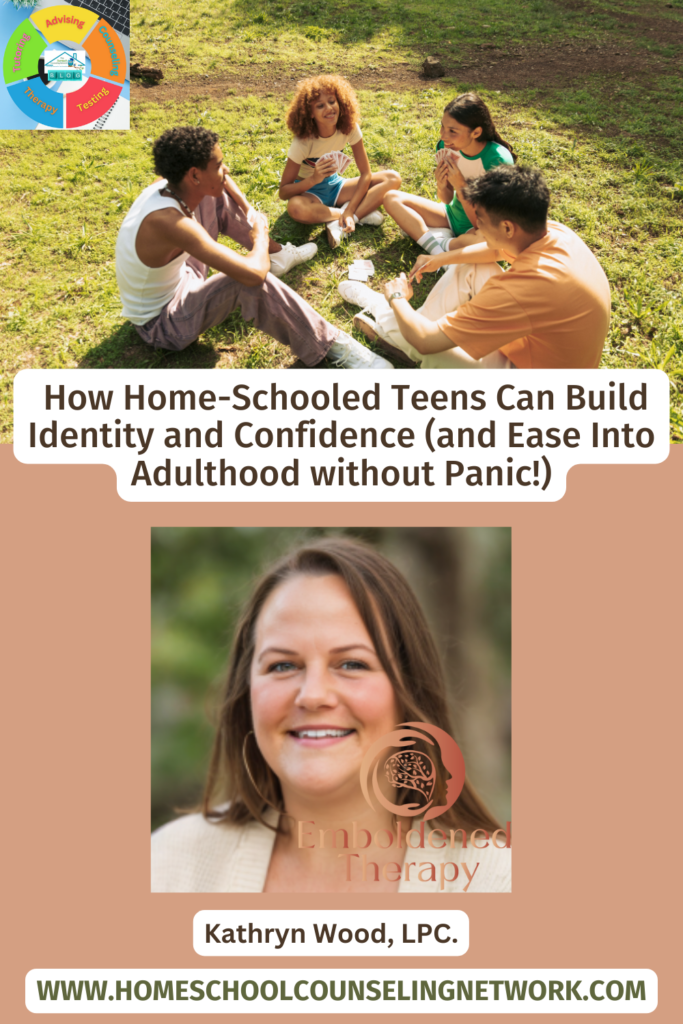HCN Guest Blogger and Therapist Kathyrn Wood Shares How Home-Schooled Teens Can Build Identity and Confidence (and Ease Into Adulthood without Panic!)
Hey there, home-schoolers (and parents of home-schoolers)! You know that panicky feeling when you realize you’re growing up and have to do all that adult stuff soon—like getting a job, paying bills, or figuring out how taxes work (yikes)? Yeah… that can be a little stressful! But you’re not alone, and plenty of others have been where you’ve been. You’ve got this, and I’m here to help you feel more confident about it all!
As you get closer to those big “adulting” moments, it’s important to build up your identity—who you are and what you care about—plus your social confidence. From one former homeschooler (for most of my academic career!) to another, having a strong sense of who you are (and how to talk to people without feeling awkward) is going to help a LOT when going through planning post-school plans and what you envision for the next chapter in your life.

So, with all that said, here are five tips that’ll help you get ready for your next steps in life:
1. Get Out There and Try New Things (Yep, Social Anxiety and All!)
Look, we know it’s super comfy staying at home, but you can’t figure out who you are by binge-watching Netflix or doomscrolling social media all day (even if you’re learning cool trivia). Getting out into the world is a big part of building your identity—and it’s way easier to make friends when you’re doing stuff you like.
Here’s how:
- Join a club, youth group, or sports team: Whether you’re into soccer, debate, or art, joining a group helps you connect with people who like the same stuff as you. Many states have laws that require you to be allowed in your school district’s extracurriculars, and this is a great way to get started. For example, I participated in chorus and the high school musicals; while some of my siblings did sports and science clubs! Your city might also have a ‘co-op’, which is a space to come together with other homeschoolers for academic or special interest outlets. A quick Google search will help you (or your parents) figure out what’s in your area to get started!
- Volunteer: Helping others makes you feel good about yourself (hello, self-esteem boost!) and teaches you real-world skills like teamwork, problem-solving, and how to not spill soup at a food bank. Bonus: your schedule is super flexible, compared to other teens, so you can find many more options to volunteer during the weekday with your peers – while flexing your academic work at home around these interests!
- Take a class or workshop: Whether it’s music, coding, or cooking, learning something new helps you find what you’re passionate about. Plus, you might just meet your new BFF while learning how to make the perfect omelet. This might be through your local community college – many of which will often have non-credit classes open to teens as young as 16; your town’s community center; or, again, checking out what the school district and nearby homeschool co-op has going!
For parents: Encourage your teen to try different activities, but let them choose what interests them. They don’t have to do all the things, but on the flip side, discouraging any type of social interaction outside of the home is setting them up for anxiety, worry, and more dependence on you long-term. Even though it might be scary for you to encourage them to do something new or different, it’s a win-win for both of y’all to see your teen develop a sense of accomplishment by facing fears and building interests. Knowing you’re helping your kid become their highest self in their journey toward adulthood is something to pat yourself on the back for!
2. Start Making Your Own Decisions
Believe it or not, being an adult means you get to call the shots. But it also means you have to call the shots, and that can feel a little overwhelming. So, why not practice now? Making decisions on your own helps build confidence—and hey, if it goes wrong, at least it’s a learning experience, right?
Here’s what you can do:
- Take control of your schedule: Decide when you want to do your schoolwork, hobbies, and hangouts. Learning to manage your own time is super important when you’re an adult (just ask anyone who’s missed a dentist appointment!). If your parent(s) tend to dictate the schedule, this is a good time to build assertive communication skills. Collaborate with your parents to switch up your schedule, and give proof of how you’ll still be able to meet your academic goals – even with some change-ups!
- Set goals and make plans: Think about what you want to achieve in the next few months or years. Do you want to learn a new skill? Start saving money? Get a part-time job? Whatever it is, taking charge of your goals will help you feel more ready for adult life.
For parents: Give your teen the space to make decisions—even if they mess up a bit. It’s all part of the process. Offer advice when needed, but let them figure some things out on their own. Be okay with a little disarray, and learn how to tolerate your discomfort in letting your teen become more independent! Again, it might be scary, but their future self will be incredibly grateful in the end.
3. Practice Being Social (Without Feeling Super Awkward)
Yes, we know—small talk can be awkward, and making friends doesn’t always come naturally. But, good news: you don’t need to be a social butterfly to be confident in social situations. It’s all about practice!
Here are some ways to get started:
- Go to events: Whether it’s a local book fair, a music concert, or a game night, just showing up is half the battle. You don’t have to be the life of the party, but attending events helps you get used to being around people. It’s totally okay to just stand on the sidelines of a conversation at first, and soak it in. If there’s something super interesting to you, or where you can offer insight, jump in! The worst thing that can happen is you get ignored, and then you can just go invest your energy in a different conversation. 🙂 You’ll survive, and the more practice you get socializing, the better you’ll get at it!
- Join online communities: If in-person stuff feels too intimidating right now, try online spaces. There are groups for everything these days—just make sure to keep things safe and respectful! Whether you’re checking out a Reddit sub, a Meetup group, or a Discord Thread, just make sure you’re abiding by internet safety precautions, and if you ever get a weird vibe check, talk with your parents about your concerns!
- Travel and explore: If you have the chance to visit new places, take it! Seeing new places and meeting new people helps you feel more comfortable in unfamiliar situations—like that first awkward day at your future job. When I was a teen, I joined several different faith denominations’ youth groups and got to participate in several service trips in the US, and outside of it. Even though I was raised in one specific faith base, everyone in the group was receptive and encouraged by my involvement because we were all there just trying to do good in our local and international communities.
For parents: Encourage your teen to step out of their comfort zone, but don’t push them too hard. Celebrate the small wins—like saying “hi” to someone new or surviving a group event without feeling weird the whole time! Help them gradually build up their social activities to a level that makes sense for them, and help them re-calibrate when motivation might be challenged. Looking at the big picture of why they’re doing all this goes a long way in staying the course!
4. Work on Your Emotional Superpowers
Okay, so I’m not saying you’ll suddenly be able to fly or read minds, but understanding your emotions and learning to deal with them is kind of like having a superpower. Knowing how you feel—and why—helps you handle tricky situations better (like when your friends start talking about something you don’t agree with).
Here’s what can help:
- Journaling: Write down your thoughts and feelings when things get confusing. This helps you see patterns and understand your emotions better.
- Empathy practice: Try to put yourself in other people’s shoes. When you understand where someone’s coming from, it’s easier to talk to them—even if you don’t agree.
- Conflict resolution: When arguments happen (and they will), stay calm and listen. Learning to talk things out like an adult takes practice, but it’s worth it.
- Join a teen support group: Teen groups that are led by mental health professionals or life skills coaches can be an incredible way to work on your emotional IQ. Plus, it gives you an outlet to have more social connectivity with other like-minded teens! You can do a quick Google search for spaces like this in your area, or check out online group offerings via sites like the Homeschool Counseling Network, Psychology Today, Therapy Den, and related outlets!
For parents: Be an example by showing how you healthily handle emotions and disagreements. Teens are watching (even when you think they’re not), and they’ll pick up on those cues. It’s important that your teens also understand that just because one parent or guardian might be home more often to do the schooling, it doesn’t mean the other parent isn’t a safe space! If both parents are in the home, or a parent and another guardian (grandparent, for example), be sure both folks are represented in important discussions, decisions, and conflict resolution to role model for your kids. And, when in need, seek your own mental health support!
5. Explore Who You Are (Without Judgement!)
Figuring out your identity takes time—and guess what? It’s okay to change your mind along the way. Whether you’re into punk rock one day and classical music the next, or thinking about becoming an astronaut before realizing you’re more into art, it’s all part of the process.
Here’s how to get comfy with who you are:
- Try new hobbies: Explore what excites you, whether it’s drawing, coding, or playing the ukulele. You’ll learn more about yourself by trying new things, and even if transportation, scheduling, or money is a limit, the internet has an abundance of ways to learn a new skill or outlet and try out new activities. Get to Googling!
- Talk about your future: Share your ideas, dreams, and even your fears with someone you trust—whether it’s your parents, a friend, a community mentor, or a therapist (hey, that’s what we’re here for!).
- Embrace the weird: Everyone’s a little weird, and that’s what makes life fun. Don’t be afraid to be yourself, even if you don’t fit into a certain “box.” I used to be that ‘weird homeschool kid’ at the school events – and once I owned it (instead of obsessing over how people saw me), it stopped being an issue! It’s like a bully – you can take everything they’re saying seriously and show them a reaction, or try to fight back, and they just keep on going for you. OR you can just agree with them mockingly – “Yeah, I’m SO lame. Yep, total loser here,” and they get bored and move on. 🙂
For parents: Support your teen’s exploration. Whether they’re suddenly into a new fashion trend or thinking about a career change, let them know it’s okay to evolve. Encourage their discovery, and give them the resources when you can!
Wrapping It Up
So, there you have it. Building your identity and social confidence as a home-schooled teen doesn’t have to be stressful (or boring). Try new things, take control of your decisions, practice socializing, develop emotional intelligence, and most importantly—don’t be afraid to be yourself. Growing up is an adventure, and even though it has its awkward moments, you’ll figure it out. And parents, remember: your teen will get there with your support and encouragement. So, let’s embrace the journey and get excited for all the awesome things to come! If you or your teen find it might be helpful for a little more support, consider seeking therapy to support these changes and needs. HCN is a great place to start!
About the Author

Want To Write For Us?
Learn more about how you can become a guest blogger for The Homeschool Counseling Network here.

Let’s Keep In Touch
Be sure you do not miss a blog post by signing up for our newsletter or joining our Facebook group.
Blessings,
Kimberly Bennett, LPC
Founder/CEO The Homeschool Counseling Network Inc.

This website is not a professional counseling website and nothing here should be construed as professional counseling advice. Although Kimberly Bennett, LPC is a Licensed Professional Counselor, she is not your counselor, and no counselor-client relationship is established unless she has signed an agreement with you. All information provided through this website is for informational and educational purposes only.